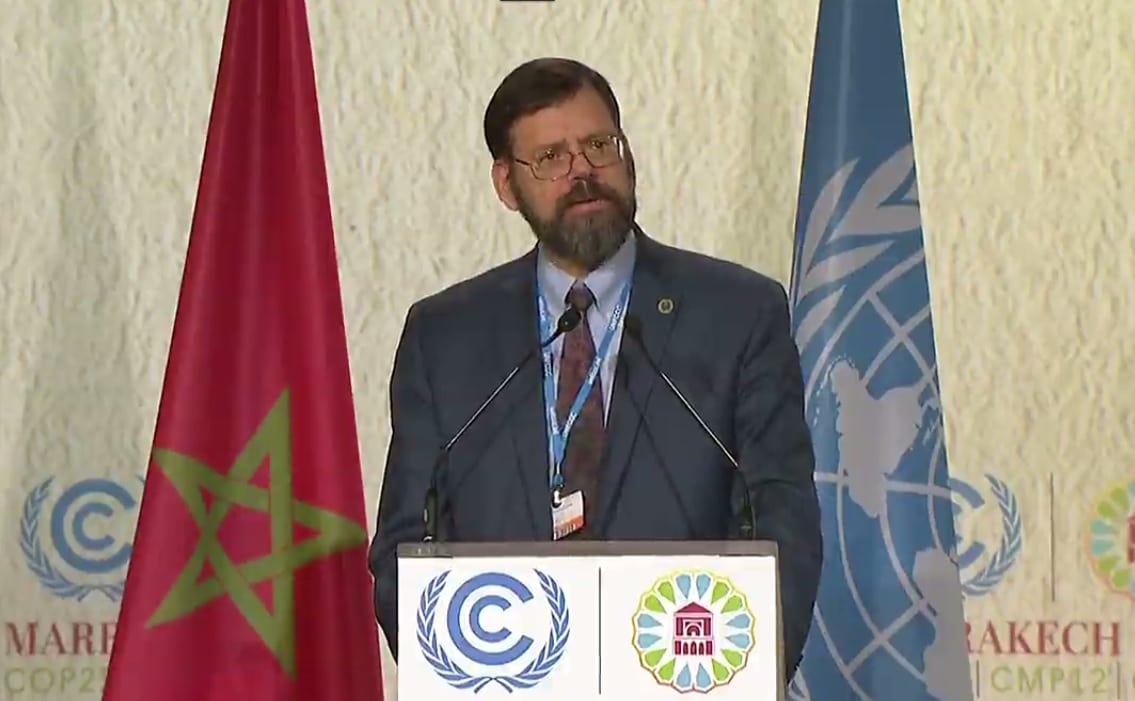
MARRAKESH, Morocco — An address that was once imagined as a victory lap took a different tone Thursday as Special Envoy for Climate Change Jonathan Pershing represented the U.S. for the Obama administration’s final speech before the Conference of the Parties to the United Nations Framework Convention on Climate Change. The address took place just weeks after the historically speedy entry into force of the Paris Agreement on climate change, but Pershing’s focus was on strong national market signals, not strong U.S. leadership, regardless of President Barack Obama’s integral role in striking the deal.
“Business is moving, U.S. business leaders are very nearly unanimous in their view that transition to a clean energy provides vast economic growth potential and that the transition to clean energy is inevitable,” Pershing said.
The reason for the apparent shift in message is not hard to distinguish. The U.S. election of Republican President-elect and climate skeptic Donald Trump sent COP22 into a tizzy last Tuesday, and questions of continued U.S. leadership on climate issues persist.
Trump has repeatedly stated his intention to “cancel” the Paris Agreement, the first international climate accord to include developed and developing nations. The Obama administration has painted the agreement as historic, a sure solidification of the president’s legacy on climate issues.
The Obama administration came into the UNFCCC with a goal, to develop an international climate agreement that the U.S. could take part in, this meant developing an agreement that wouldn’t have to come before Congress. The administration did not want a repeat of the Kyoto Protocol, which was Congress voted against.
After years of conferences, the U.S. took a leadership role negotiating the Paris Agreement, the world’s first universal climate agreement, applying to developed and developing nations. Importantly, the U.S. negotiated an agreement under which national targets are not legally binding, the key to avoiding Congress.
Absent a clear indication that the U.S. federal government will remain involved, the current administration has looked to nongovernmental players to reassure the masses of continued climate action. “The United States is rapidly transitioning to a clean energy economy,” Pershing said. “In the electricity sector, our largest emitter of carbon dioxide, wind generation has tripled, and solar generation has increased 30-fold due to dramatic decreases in costs. This is in large part the result of market-based changes that cannot be reversed.”
Pershing, and earlier in the week Secretary of State John Kerry and Special Adviser to the President Brian Deese, have relied heavily on words like “irreversible” and “unstoppable” to describe the state of subnational climate actions. “I can tell you and, I truly believe this, that while we have many profound challenges to wrestle with, the momentum is now insurmountable, there is no stopping,” Pershing told the COP.
After only briefly pointing to the regulatory and executive actions the Obama administration has taken over the last eight years to address climate change, Pershing downplayed the role of the executive branch in leading action in this sphere.
Regardless of the inevitability of Trump’s presidency, the U.S. delegation has continued its work representing the current administration at the COP. Pershing said it has been going well. The two week meeting is scheduled to end today, though COPs are notorious for running late. “In the final days of the COP the remaining discussions are largely procedural and are expected to focus on reaching a common understanding about how best to accelerate our collective work to implement the Paris Agreement,” Pershing said during a Thursday afternoon briefing.